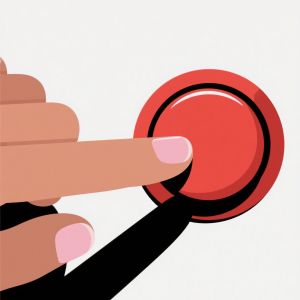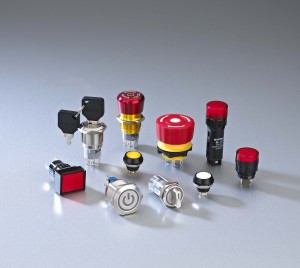Core Structure of Push Button Switch: The Bridge of Human-Computer Interaction
In daily life, push button switches are one of the most familiar electronic components to us. Whether it's turning on/off a table lamp, selecting a floor in an elevator, or function buttons in a car, there is a set of precise mechanical and circuit collaboration systems behind them. The core structure of a button switch typically includes four parts: housing, contacts, and drive mechanism:
· Housing: Protects internal structures and provides an operation interface.
· Spring: Responsible for resetting, pushing the button back to its original position after pressing
· Contacts: Divided into fixed contacts and movable contacts, realizing circuit on/off through contact or separation.
· Drive mechanism: Connects the button and contacts, transforming the pressing action into mechanical displacement.

Working Principle: The Chain Reaction Caused by Pressing
(1) Pressing Stage: Breaking Circuit Balance
When the button is pressed, the drive mechanism drives the movable contact to move downward. At this time, the spring is compressed, storing elastic potential energy. For a normally open switch, the originally separated movable contact and fixed contact begin to touch, and the circuit changes from an open state to a closed state, starting the device; for a normally closed switch, the opposite happens, where the separation of contacts breaks the circuit.
(2) Holding Stage: Stabilizing Circuit State
When the finger continues to press, the movable contact remains in contact with (or separated from) the fixed contact, and the circuit maintains the on (or off) state. At this time, the compressive force of the spring balances the contact resistance of the contacts, ensuring stable signal transmission.
(3) Resetting Stage: Energy Release of the Spring
After the finger is released, the spring releases the stored potential energy, pushing the button and movable contact to reset. The contacts of the normally open switch separate again, breaking the circuit; the normally closed switch restores contact, closing the circuit. This process is usually completed within milliseconds to ensure operational sensitivity.
Function of Push Button Switch: Precise Selection for Different Scenarios
- Normally open/normally close :
The most basic on/off control. When you press the button and the light bright, it is a normal onpen (NO) switch. Conversely, if the light only bright when the button is released, it is a normal close (NC) switch.
For more detailed content >>

- Momentary push button switch : Conduct when held and break when released, such as doorbell buttons
- Latching push button switch: Lock the state when pressed once and unlock when pressed again, such as electric fan gear switches
Conclusion: Engineering Wisdom Behind Small Buttons
From the precise coordination of mechanical contacts to the application of materials science, button switches demonstrate humanity's wisdom in solving complex problems with simple structures. The next time you press a switch, imagine how the force from your finger travels through the spring and contacts to complete a precise circuit dialogue in the micro world – this is the most touching connection between technology and life.
If you are not sure which push button switch suits you, feel free to contact ONPOW!













